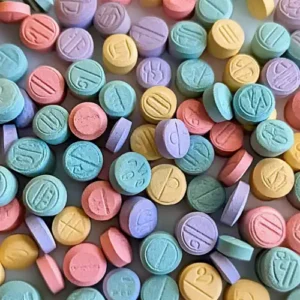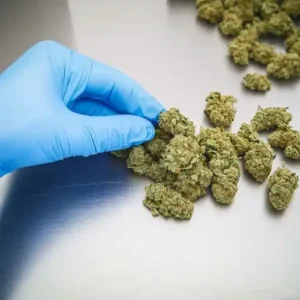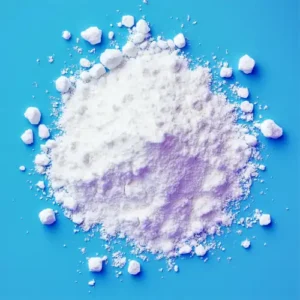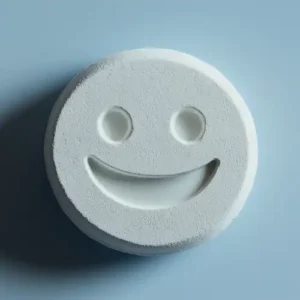The generic antidepressant fluoxetine, better known by the brand name Prozac, helps those who are dealing with clinical depression, however, there are risks associated with taking the drug. Abusing Prozac is fairly common, but experts don’t believe it is an addictive drug.
Prozac has a generic brand name of Fluoxetine. This type of drug is selective serotonin reuptake inhibitor (SSRI). Prozac does not belong to the group of drugs known as benzodiazepines, so it cannot be detected using a benzodiazepines drug test.
Anyone who is taking a prescription medication should also think about the addictive aspects of the drug. If a drug is designed to make you feel good, it is understandable that it could easily be abused. For example, if you feel relaxed when you take Prozac and your symptoms of depression disappear, you might want to take more than what the doctor prescribes. Or, your doctor might suggest that you stop taking the drug. Since it makes you feel good, you might want to ignore your doctor’s advice.
Is Fluoxetine Addictive?
Experts proclaim that Prozac isn’t addictive or habit-forming. But, you should know that if a drug is abused, there is a good chance that you could become dependent on it psychologically. Prozac could give you the feeling that you can’t relax or go to sleep at night without it. Another real fear is that if you stop taking it that your depression will come back in full force. This hesitation could make you think that you can’t live without the drug.
Prozac’s Side Effects
Addiction to Prozac isn’t common, but the abuse if it is. Abuse of it indicates there is an increased chance of suffering the negative effects. The side effects you might experience might be even more severe than usual. Some of Prozac’s side effects include dry mouth, drowsiness, excessive sweating, loss of appetite, sore throat, nervousness, weight loss, nausea and a diminished sex drive. Some of the more severe but rare side effects include rash and hives, swelling and joint pain, problems breathing, fever, confusion, seizures and hallucinations.
If you have been abusing Prozac, you will experience withdrawal symptoms when you stop using it. Antidepressant discontinuation syndrome is the official name given to this condition and it is a serious concern. Irritability, anxiety, fatigue, headaches, depression and flu-like symptoms are some of the withdrawal symptoms. Have you been abusing Prozac? Are you concerned about withdrawal? Before you stop taking the drug, consult with your doctor. To stop the syndrome from occurring, your doctor will help you to slowly come off of it. It is dangerous to abuse any drug, so know the side effects before using.
Here are 500 words of extra content in UK English to extend the article:
Dangers of Prozac Abuse
Prozac is not considered an addictive substance, but abusing the drug can lead to dependence and have serious health consequences. Some of the key dangers of Prozac abuse include:
Developing a dependence – Even though Prozac is not addictive, psychological dependence can occur with abuse of the medication. People may feel they cannot function without the drug and become afraid to stop taking it. This can motivate continued abuse.
Increased side effects – Taking more Prozac than prescribed increases the risk for common side effects like insomnia, anxiety, nausea and sexual problems. High doses also raise the chances of experiencing rare but serious side effects like suicidal thoughts and seizures.
Severe withdrawal – Suddenly stopping Prozac after abuse can trigger withdrawal symptoms like depression, fatigue, dizziness, flu symptoms and electric shock sensations. This antidepressant discontinuation syndrome can be avoided by slowly tapering off the medication under medical supervision.
Drug interactions – Prozac interacts with many other drugs like MAOIs, NSAIDs, amphetamines and blood thinners. Combining it with alcohol or certain medications can be dangerous or even life-threatening. The more Prozac is abused, the higher the risks with drug interactions.
Liver toxicity – There is a small risk of liver damage associated with Prozac, especially at higher than normal doses. Abusing this medication could increase the chances of experiencing this rare but serious complication.
Worsening depression – Some people report that Prozac initially provides a mood boost or feelings of euphoria. However, this effect wears off quickly with regular use. Depression can worsen if people continue abusing Prozac seeking these temporary good feelings.
Increased suicidal thoughts – Prozac is associated with an increased risk of suicidal thinking and behavior in children, teens and young adults. Abuse of the drug may make this rare side effect more likely.
If you are struggling with Prozac abuse, talk to your doctor right away. Never quit the medication abruptly. With professional help, you can break the cycle of abuse safely.
Signs of Prozac Abuse
How can you tell if someone is abusing Prozac rather than taking it as prescribed? Some signs of Prozac abuse include:
- Taking higher doses than recommended
- Using Prozac more frequently than directed
- Continuing to use Prozac despite medical advice to stop
- Obtaining extra prescriptions from different doctors
- Reporting lost prescriptions to get more Prozac
- Visiting multiple pharmacies to fill scripts
- Taking Prozac to get high or for nonmedical reasons
- Combining Prozac with alcohol or other medications to enhance effects
- Experiencing strong cravings for the medication
- Feeling unable to stop taking Prozac
- Exhibiting mood changes like euphoria or irritability
- Displaying secretive behavior surrounding Prozac use
If you notice multiple signs of abuse, do not attempt to confront the person yourself. Instead, consult a doctor or addiction specialist to get professional help addressing the problem. With the right treatment plan, Prozac abuse can be overcome.
Getting Help for Prozac Abuse
The first step in getting help for Prozac abuse is to see a doctor. They can help safely taper off the medication and manage withdrawal symptoms. Behavioral counseling provides support for changing abusive behaviors involving Prozac. Joining a support group helps reinforce sobriety from drug abuse.
For people with depression, alternate antidepressants without abuse potential may be prescribed under close monitoring. Treating any underlying mental health conditions also helps reduce the desire to abuse substances. Making positive lifestyle changes like exercising, eating well and building a support network aids the recovery process.
With professional treatment and determination to stop abusing Prozac, it is possible to break free from dependence on the medication. The road to recovery takes commitment, but the benefits for your mental and physical health make it worthwhile. If you believe you have a problem with abusing Prozac, reach out for help today.
Photo by Anthony Cunningham for Zoom Testing
Zoom Testing is a leading UK drug testing company and a supplier of Drug Test Kits.
This post was originally published in 2021. It was last updated in January 2025.





